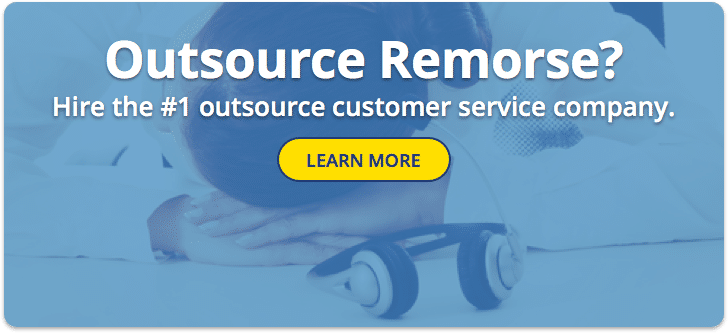How Does Your Contact Center Vendor Measure Up?
 “A strong vendor management program can properly locate & manage the right vendor partner in a crowded and chaotic competitive field.”
“A strong vendor management program can properly locate & manage the right vendor partner in a crowded and chaotic competitive field.”
Companies that outsource their contact center and back office functions need a strong vendor management program to properly locate and manage the right vendor partner in a crowded and chaotic competitive field. Companies that are looking for outside vendors to take over an existing center relationship or move an in-house center to the outside are right to expect big improvements from their decision. There must be a return on investment in the form of
- Lower Costs over time
- Higher levels of productivity
- Better employee satisfaction and stability
- Terrific customer satisfaction scores
- Consistent management to all service levels and metrics
These are just a few of the goals firms spell out to potential contact center vendors.
Too often organizations know precisely why they are disappointed in the existing center partner relationship, but when it comes to choosing the ideal challenger center their goals often fall short of other opportunities besides eliminating the current vendor pain points. What looks great on paper sometimes gets lost in practice. But, once the contract is signed, it can be a costly royal pain in the RFP to give an unsatisfactory vendor the boot. Taking time to define needs beyond the immediate fix is important.
That’s why we’ve come up with a basic primer on measuring the effectiveness of your contact center vendor.
Measuring the Effectiveness of Your Contact Center Vendor
Let’s start by considering a customer service “moment of truth.” Contact centers are brand ambassadors. The best vendors are as committed to successful delivering their clients’ message and performance as their clients are. This isn’t industry-specific; customer retention is everyone’s first priority. The best vendors will do much more than meet baseline KPIs – they will add value that advances your brand. If they aren’t doing that, show them the door. Hanging on to a poor performer is too costly to risk.
{{cta(’98f38b19-1371-4c85-aeb1-0d6d520286d6′)}}Here are a few starter tips for building a vendor evaluation and management program that gets you where you want to be.
Contact Center Vendor Evaluation & Management
Align expectations internally before vendor names are on the table. It’s not enough to know the current vendor isn’t meeting your needs. Make a detailed roadmap of where you want the investment in your vendor to take your department, division or product line. Get input from internal stakeholders, and compare that to past results. If you’re replacing a vendor, don’t limit future call center goals based on the results of an unsatisfactory arrangement. If you’re starting from bare bones, it’s critical to establish what value you want from a new vendor prior to sending out an RFP.
Get your metrics in order. This might seem like an obvious softball, but it’s not. Understand what, why and how you want to measure performance so you can communicate your expectations clearly. Identifying and listing your metrics gives you the necessary standards (above and beyond cost considerations) to measure against. Also understand what your budget will be. There is a cost to meeting each metric. Expecting too much or creating metric conflicts could cause you to overspend. Consider asking the outsourcer to suggest changes that save money if budget is a big concern.
Rethink your RFP. The same applies to technology. There are daily changes in the contact center industry. Make sure your customer base is a heavy user of each contact channel. Understand covering each additional channel will cost more. Make sure you understand your customer and have current needs right sized. If your RFP is more than a year old, it’s time for a refresh. Have your team closely review each requirement and eliminate dated information and add the new definitions.
Align expectations externally. Put every potential new vendor’s feet to the fire as early in the process as possible. A good vendor will commit to meeting as many realistic goals as they can. However, a great vendor will prove that they can step up to the plate with a history of demonstrated successes. The list of wins doesn’t need to be long, as long as it clearly shows that the vendor can knock your specific KPIs out of the park and deliver added value to your organization. Contact centers are process driven, so having a vendor that can demonstrate process control and compliance may be more important than specific industry experience.
Take care not to get bogged down in a numbers game, though – at this early stage you’ll want to see a stunning view from 30,000 feet. You’ll learn pretty quickly if the close-up view isn’t as compelling.
Standardize baseline questions. Giving identical baseline questions to all candidates will enable you to do more accurate apples-to-apples comparisons on straightforward metrics. This is especially important for pricing, technology and process questions. The use of tables and closed end questions can help with the early pass-fail review process.
Encourage communication. You can learn a great deal by asking for and sharing business insights. While this may fly in the face of ancient wisdom that says precious little info should be shared with vendors, when it comes to contact center management the benefits of sharing your business goals will outweigh the risks. You’ll better understand how the vendor thinks strategically and allow them to describe their management approach to your specific opportunity. This will help you be better equipped to gauge their ability to execute. A fresh set of eyes can open yours to possibilities you may not have considered in the past. A seasoned contact center vendor will think in terms of your strategy, and won’t just slide by on meeting baseline requirements.
Think like a partner. There’s nothing that will kill a relationship faster than ambiguity. The upside? Clarity on the client side encourages reciprocity from the vendor side. The best contact center vendors not only value your transparency, they will leverage it to your advantage by helping you reach your highest goals. They often see opportunities for process improvements, and should be unafraid to challenge status quo thinking if it’s dragging down your metrics. Be upfront about expansion plans so that your vendor can adjust quickly.
Chemistry is real. Because contact center operations are enormous ships that take tremendous time, energy and money to turn around, its important to choose a vendor with staying power and the ability to forge lasting relationships. The best vendors will get along with everyone in your company from the corner office to the front door. Do their business values mirror those of your firm? How do they operate? Who are their customers? How do they measure their own success? Are they willing to take ownership of your objectives and future plans? A strong working relationship and trust at all levels will create a more agile and flexible operation when changes are implemented.
Here are some key additional questions for contact center vendors:
- Do you have the technology to meet our needs?
- Can you integrate channels?
- Describe your selection and training methodologies.
- How do you manage on a daily basis?
- What are your guidelines for all areas of consumer and data engagement?
- What is your escalation process?
- Do you have the ability to record and store conversations, capture screen activity, validate sales and verify compliance at all points in the process?
- How do you ensure regulatory compliance?
- How do you use all the captured data to improve the program?
- Describe your process improvement methodologies.
In Nine Tips For Choosing A Compliant Outsourcing Provider we dive into more details about why these questions matter, and offer more insight on what sets a great contact center vendor apart from a good one.
Any decent contact center vendor should be able to hit your baseline metrics on the nose. An exceptional vendor will commit to your company’s success as if it were their own.
At GCS, we are serious about people, process and technology. We believe in the power of people to accomplish great things when they have access to the proper training, supervisory support, and technology. We support our clients with proven processes and a dedication to their business objectives. We are avid students and skilled teachers, committed to creating truly great customer experiences.
One of the aspects of contact center excellence that we are passionate about is training. Our methods transform good customer service reps into stellar ones, building skills, confidence and expertise. In circumstances where employee retention has been an issue, we’ve been able to stabilize the workforce and dramatically increase productivity and CSAT scores.
We’ve recently developed an online soft skills training program for exceptional customer service: Say This … Not That, Most of the Time. Whether your agents are on the phone, in chat, or face-to-face, this program offers proven strategies for building the interpersonal skills – soft skills – that agents need to excel. It’s an amazing, effective addition to every customer service arsenal. You can even sign up to get our super helpful Soft Skills Tip of the Week! To learn more, go here.
Do you have an active RFP or looking for a challenger to your existing relationship? We would like to speak with you, please Contact Us today.
{{cta(‘086bd7a8-05a0-4877-9c40-8458bb49ecd0’)}}
Request more info today
Tell us about your program and we'll get back to you ASAP.

